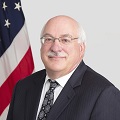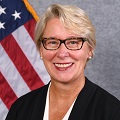
2021 PDA/FDA Joint Regulatory Conference
Registration Options
Individual Registration
Group Registration
Program Highlights
Listen to the Podcast – Find out directly from the 2021 PDA/FDA Joint Regulatory Conference Co-Chairs why, after 30 years, this conference remains the most influential conference in the industry and what critical knowledge you will gain by attending!
We're pleased to announce that three Center Directors and ORA's Associate Commissioner for Regulatory Affairs will be presenting at this year's conference!

Patrizia Cavazzoni, MD

Peter W. Marks, MD, PhD

Steven M. Solomon, DVM, MPH

Judith McMeekin, PharmD
The Parenteral Drug Association (PDA) and the U.S. Food and Drug Administration (FDA) are once again co-sponsoring the PDA/FDA Joint Regulatory Conference, which is now in its 30th year. This flagship conference provides opportunities for attendees to learn about current issues relating to manufacturing and quality assurance. The Conference emphasizes the role of effective quality systems in ensuring an ongoing state of control throughout the product lifecycle by vigilantly managing risks to manufacturing and quality. The roles of robust systems, facilities, processes, raw material quality, supplier relationships, industrial modernization, and quality risk management are emphasized. Case studies are presented throughout the conference to provide practical insights into these concepts and illustrate how sustainable compliance establishes the foundation for quality and supply consistency. International collaboration efforts that improve quality and benefit the consumer are also highlighted.
At the completion of this conference, participants will gain skills to:
- Conduct successful investigations of Out-of-Specification (OOS)/Out-of-Trend (OOT) findings
- Effectively implement data integrity remediation
- Establish robust processes and maintain state of controls
- Improve product availability and avoid shortages
- Manage post-approval changes and change management processes
- Successfully implement quality management techniques and robust manufacturing
- Update facilities to support dependable quality and supply
Contact
Program Inquiries
Training Course Inquiries
Registration Customer Care
Standard Registration
Member Price
$1,341GovernmentMember Only
$392
Health AuthorityMember Only
$392
StudentMember Only
$157
AcademicMember Only
$392
Non-Member
$1,537
Day 1
MONDAY, 27 SEPTEMBER
|
09:15 – 11:00 | Plenary 1: Opening Plenary |
|
09:15 | Welcome and Opening Remarks from PDA Leadership and Conference Co-Chairs 09:35 | Patrizia Cavazzoni, MD, Director, CDER, U.S. FDA 10:00 | Q&A with Dr. Cavazzoni 10:15 | Operating during a Global Pandemic Lessons Learned: Development through Production |
11:00 – 11:30 | Virtual Exhibit Hall Open and Connect & Network
|
11:30 – 13:00 | Plenary 2: Emerging Stronger through Collaboration A wise man said that “Perseverance is not a long race; it is many short races one after the other.” Over the last eighteen months, we have won many of these short races together as we have adapted to the changing landscape driven by the pandemic. In this session we will hear from regulatory and industry leaders on those races; the practical challenges we have overcome from the simple to the complex, the transformative level of collaboration we have seen internally and externally, the innovation that we have accelerated and the changes that will enable us to emerge stronger. |
|
11:30 | Engaging Stronger Together: A Regulatory Perspective 11:48 | Covid-19 Industry Perspective: Practical Challenges and Transformations 12:09 | Q&A with Speakers and Additional Panelist |
13:00 – 13:30 | Virtual Exhibit Hall and Connect & Network
13:30 – 15:00 | Concurrent Sessions
QUALITY ASSURANCE AND QMSA1: Managing Investigations in a Global Network Today's global pharmaceutical supply chain typically includes many contributors to production of a drug. Strong quality system provisions and actions are needed when deviations, OOS results, or failures occur to ensure communications and close collaboration on investigations and resolutions. This session will address the attributes of quality systems that successfully manage cross-organizational investigations, with an emphasis on lessons learned and practical case studies. |
|
13:30 | Managing Investigations with Supply Chain Partners Using a QRM Mindset 13:55 | Effective CAPA Practices as a Competitive Advantage 14:20 | Q&A with Speakers and Additional Panelists |
SUPPLY CHAIN AND MANUFACTURING CHALLENGESB1: Supply Chain Collaboration and Product Approvals during a Pandemic As treatments for COVID-19 infections were deployed during the pandemic, we were faced with challenges in drug supply of life saving medicines. Some countries enacted export bans of certain drugs, and other factors including plant staffing caused strains on the existing supply chains of APIs, raw materials, and finished drug products. Pandemic travel bans limited inspections of drug manufacturing facilities. We will examine the effect of the pandemic on drug supply chain and drug applications. The session will include regulatory experiences with EUAs and how use of tools such as remote assessments provided insight into facilities named in drug applications. |
|
13:30 | Supply Chain and Inspections during the Public Health Emergency (PHE) 14:03 | Supply Chain Collaboration during a Pandemic 14:17 | Q&A |
EMERGING TRENDS AND INNOVATIONC1: Holistic Capacity Planning: Best Practices and Lessons Learned from New Therapeutic Modalities Sudden onset of market and public health demands during in the face of global pandemic could lead to major capacity crunches causing production delays and/or unintended product quality outcomes. Holistic evaluation of process, facility, and operational requirements to identify potential bottlenecks is critical when planning for projected commercial manufacturing expansion (scale-up or scale-out) to ensure timely delivery of transformative therapies to patients with consistent product quality. Rapid advancement of C>s products and COVID-19 vaccines necessitated implementation of flexible and sustainable operational and facility designs. These could offer valuable learnings with operational aspects of individualized therapies possibly as challenging as those for the off-the-shelf products. What are the best practices how firms incorporate effective end-to-end capacity planning? What are the regulatory expectations for capacity analysis and process expansion validation? This session will invite regulatory and industry experts to discuss key considerations for end-to-end capacity planning mitigating supply chain vulnerabilities for cutting edge lifesaving therapies. |
|
13:30 | Capacity Considerations for Cell & Gene Therapy Products 13:50 | Capacity Considerations for Individualized Therapies 14:10 | mRNA Vaccines: A Paradigm Shift for Product Development and Manufacturing Capacity 14:30 | Q&A with Speakers and Additional Panelist |
15:00 – 15:30 | Virtual Exhibit Hall and Connect & Network
|
15:30 – 17:00 | Ask the Regulators U.S. FDA investigators, reviewers, and compliance officers will answer your questions in this Q&A session that will provide you with insights regarding current topics and initiatives. |
|
Review-Based Panel Discussion
15:30 – 16:15 | Pre-Recorded Panel Discussion 16:15 – 17:00 | Live Panel Discussion and Q&A |
|
Inspection-Based Panel Discussion
15:30 – 16:15 |Pre-Recorded Panel Discussion 16:15 – 17:00 | Live Panel Discussion and Q&A |
Day 2
TUESDAY, 28 SEPTEMBER
08:30 – 09:30 | Special Topic Sessions
|
Special Topic 1: Mitigating Risk to Container Closure Integrity of a COVID-19 Vaccine Product during Ultra-Cold Chain Storage and Distribution Studies have shown that ultra-cold temperatures (-70° C and colder) can introduce risk to the container closure integrity (CCI) of a sealed sterile product vial. This session will present and describe a robust approach for mitigating this risk using work done for the BNT162 mRNA vaccine as a case study. The work included the application of QbD principles to generate robust analytical data on the primary packaging system in the development phase, and then using this data for risk-based qualification and control of the vial sealing process. The holistic approach described and discussed in this session is useful for upcoming therapies needing an ultra-cold chain for storage and distribution. 08:30 | Effects of Ultra-Cold Chain Storage and Distribution on Vial Container Closure Integrity 08:50 | Mitigating Risk to Container Closure Integrity of a COVID-19 Vaccine Product during Ultra-Cold Chain Storage and Distribution 09:10 | Q&A
|
|
Special Topic 2: Quality Management Maturity (QMM) and Metrics: What Does the Future Hold? 08:30 | Summary of PDA’s Recent QMM and Standards Initiatives 08:43 | QMM Pilot Status and Future QMM/Metric plans Jeff R. Broadfoot, MBA, Senior Director, Quality, Emergent BioSolutions Inc. Steven R. Mendivil, BS, Senior Advisor for Quality, Amgen, Inc. |
|
Special Topic 3: Current Microbiology Topics 08:49 | Q&A with Speakers and Additional Panelists |
09:30 – 09:45 | Break
|
09:45 – 11:15 | Plenary 3: Compliance Office Updates |
|
09:45 | CBER Compliance Updates 10:00 | CDER Compliance Updates 10:15 | CVM Compliance Updates 10:30 | ORA Compliance Updates |
11:15 – 11:45 | Virtual Exhibit Hall and Connect & Network
|
11:45 – 13:15 | Plenary 4: Current GMP Compliance Trends and Topics |
|
11:45 | CDER Update 12:10 | CBER Update 12:35 | Q&A with Speakers and Additional Panelists |
13:15 – 13:30 | Break
13:30 – 15:00 | Concurrent Sessions
QUALITY ASSURANCE AND QMSA2: Non-Sterile Drug Products: Microbial Risks Microbial control of non-sterile drug products is essential as the presence of objectionable microcontamination in non-sterile drug products poses a risk to patient safety and product stability. Recent incidents associated with Burkholderia cepacia complex (BCC) contamination in non-sterile aqueous products emphasizes the importance of a robust design and control program to prevent non-sterile drug product manufacturing risks. An effective risk-based approach will help to understand and mitigate potential microbial hazards in manufacturing and evaluate their potential impact on the finished product quality. This session will focus on the quality risk management of microbial risks of non-sterile products by taking into consideration, among other things, the dosage form characteristics, hygienic design and maintenance of process equipment, including the water system, cleaning and sanitization program, and the type of manufacturing process as these may impact the contamination risk level. |
|
13:30 | The Complex: Science, Policy, and Case Studies of The Burkholderia Cepacia Complex in Aqueous Nonsterile Drugs 13:53 | Microbiological Contamination Controls for Nonsterile Manufacturing 14:30 | Q&A with Speakers and Additional Panelist |
SUPPLY CHAIN AND MANUFACTURING CHALLENGESB2: Supplier Oversight The globalization of pharmaceutical manufacturing of API and FDF has been accompanied by explosive globalization of the supply chains. The number of entities performing distribution, packaging, transportation, warehousing, contract manufacturing/testing, material supply, and other functions, has added greater complexity to ensuring safety and quality of drug products. This session will focus on managing lifecycle risks introduced by global supply entities, as illustrated by real world case studies. The discussion will also reference multiple relevant ICH guidances. |
|
13:30 | Greenfield Site Biologic Drug Substance Licensure Preparation 13:48 | Risk Management in Technology Transfer: The Receiving Site Perspective 14:23 | Q&A with Speakers and Additional Panelist |
EMERGING TRENDS AND INNOVATIONC2: Drug Quality Lifecycle: Current Regulatory Concerns Setting the stage for the approval of a quality product application requires the establishment of CMC standards in an application and the selection of manufacturing facilities capable of producing a quality product throughout the product lifecycle. The SARS-CoV-2 pandemic has highlighted the demands of accelerated and streamlined CMC development timelines associated with supplying a quality product to patients without manufacturing delays and disruptions – and doing this while paralleling rapid clinical development timelines. This session will discuss aspects that can allow for streamlining CMC product development and facilitate the submission of a quality application to the FDA. Critical early decisions for the selection of manufacturing facilities and the use of appropriate manufacturing technologies will be discussed. |
|
13:30 | Regulatory Approaches to Accelerated Sars-CoV-2 Neutralizing Antibody Development 13:54 | Delivering Therapeutic mAbs for COVID-19: What Can Be Done in Just One Year 14:17 | From Benchtop to BLA in Record Time: A Case Study 14:37 | Q&A with Speakers and Additional Panelist |
15:00 – 15:30 | Virtual Exhibit Hall and Connect & Network
15:30 – 17:00 | Concurrent Sessions
QUALITY ASSURANCE AND QMSA3: Quality Systems: How to Ensure Resilience and Effectiveness Quality is a mindset that impacts everyone and every relevant decision we make. A quality mindset starts at the top with strong support from executive leadership and is embedded in all functions and actions. A modern quality system and risk management approaches help manufacturers to meet the requirements of the Agency's current good manufacturing practice (CGMP) regulations for drugs (2l CFR parts 210 and 211) on a continuous basis. This session will explain why regulatory actions are taken and how regulators determine regulatory significance. An experienced quality professional will share her knowledge and experience in the remediation of several Consent Decrees and warning letters. The road to remediation has required systemic improvements in quality culture and quality systems. Insights into establishing and sustaining a culture of quality assurance (and thus CGMP compliance) will be explained by senior leadership from both the regulatory and industry perspective. |
|
15:30 | Carmelo Rosa, PsyD, Division Director, Office of Manufacturing and Product Quality, CDER, U.S. FDA 15:55 | QMS – Quality Impact 16:20 | Q&A with Speakers and Additional Panelist |
SUPPLY CHAIN AND MANUFACTURING CHALLENGESB3: Manufacturing during and after the Pandemic This session will focus on some of the many challenges manufacturers face when bringing critical medicines to market during a pandemic. We will focus on concrete strategies firms used during the past year to address high absenteeism, prevent disease spread in their facilities, handle supply chain disruptions, and determine what work could be managed from remote settings. In addition, the session will focus on how firms assessed their current microbial controls strategies for effectiveness in preventing entry of SARS-CoV2 particles into their production streams. Finally, we will discuss the regulatory expectations for manufacturing during times of high absenteeism and under pandemic conditions. |
|
15:30 | "This was their finest hour."- Winston Churchill Manufacturing during a Global Pandemic 15:51 | Quality Considerations and Verification of SARS-CoV-2 Safety Margins 16:09 | Manufacturing During and After the Pandemic: A Regulatory Perspective 16:34 | Q&A |
EMERGING TRENDS AND INNOVATIONC3: Improving Manufacturing via Modern Technology The pandemic has highlighted challenges throughout the world in ensuring continuity of operations in both the public and private sector. The use of modern technology during these times has reinforced the value of highly capable manufacturing and robust quality management. During this session we will present some of the ways modern technologies can be used to strengthen operational controls, enhance oversight and monitoring, minimize the potential for human error, and contribute to the advancement of public health. Hear from experts in the field on the potential applications of modern manufacturing technologies including isolator design, automation, and other innovative efforts. The session will also address how modern technology can be used to enhance knowledge management to the benefit of both industry and regulatory decision making. |
|
15:30 | Robotics and Biometrics Initiatives in Drug Product Manufacturing 15:50 | Facilitating Deployment of Autonomous Mobile Robotics (AMRs) 16:10 | Considerations for Adopting Modern Technologies 16:30 | Q&A |
Day 3
WEDNESDAY, 29 SEPTEMBER
08:30 – 09:30 | Special Topic Sessions
|
Special Topic 4: PDA QbD Book and PDA Vaccine Development Lifecycle Technical Report 08:50 | Quality by Design: An Indispensable Approach to Accelerate BioPharmaceutical Product Development 09:10 | Q&A with Speakers and Additional Panelist |
|
Special Topic 5: AI Research Force (AIRForce) Group: Focus on Artificial Intelligence and Machine Learning |
|
Special Topic 6: Risk Management of Non-Ingredient Suppliers The pandemic has no doubt created lots of shortage in our supply chain, including materials used in the manufacturing process of various drugs and vaccines. Due to the complicated supply chain management, manufacturers come to face with back orders of supplies, such as glass vials, stoppers, sterile filters, single use systems, etc. Distress grows as manufacturers learned that their supply is on back order which forced them to look for alternatives in manufacturing capability and flexibility in regulatory communication with the FDA. 08:30 | Risk Management of Non-Ingredient Suppliers: Current Regulatory Concerns 08:45 | The Use of QRM to Ensure Process and Product Control During Non-Ingredient Material Shortage 09:05 | Q&A with Speaker and Additional Panelist |
09:30 – 09:45 | Break
|
09:45 – 11:15 | Plenary 5: Center Updates |
|
09:45 | CBER Updates 10:00 | CDER Updates 10:15 | CVM Updates 10:30 | ORA Updates 10:45 | Q&A with Speakers and Additional Panelist |
11:15 – 11:45 | Virtual Exhibit Hall and Connect & Network
11:45 – 13:15 | Concurrent Sessions
QUALITY ASSURANCE AND QMSA4: Process Validation Lifecycle: 10 Years in Review W. Edwards Deming's 14 Points for Total Quality Management includes the following point: Improve constantly and forever every process for planning, production and service. A foundation of modern quality systems for all industries, this point speaks to the framework of the U.S. FDA's pharmaceutical process validation approach. 2021 marks the 10th anniversary of the U.S. FDA publishing the paradigm shifting Guidance for Industry: Process Validation: General Principles and Practices." This session will explore the lifecycle approach to process validation, including discussion of knowledge and data from development lots and commercial scale studies, along with continued process verification (CPV). Representatives from FDA and regulated industry will present case studies and examples to illustrate how commercial manufacturers can ensure that the process remains in a state of control over the lifecycle of the product, which includes identifying opportunities and implementing changes to achieve continual improvement. Attend to listen to a discussion of where process validation is and can be - or should be - 10 years from now. |
|
11:45 | Process Validation Lifecycle: Benefits and Learnings from Implementation 12:10 | Process Validation Lifecycle: 10 Years in Review 12:35 | Q&A with Speakers and Additional Panelist |
SUPPLY CHAIN AND MANUFACTURING CHALLENGESB4: ICH’s Initiatives to Advance Global Harmonization, Innovation, and Continual Improvement Throughout Lifecycle |
|
11:45 | Quality Risk Management: An Update on the Ongoing Revision of ICH Q9 12:10 | Implementation of ICH Q12 12:35 | Q&A with Speakers and Additional Panelist |
EMERGING TRENDS AND INNOVATIONC4: Moving Quality to the Next Level: "What Would it Take?" This session will explore innovative ways to continuously improve quality for the future. We will learn the benefits of tools/techniques that go beyond traditional key performance indicator (KPI) monitoring to exploring ways that provide predictive/leading metrics to better understand an organization’s risk profile. This session will provide insights and case studies from industry speakers on the opportunities and challenges with implementing digitalization within their firms. A review of how innovation/digitalization is transforming the traditional ways of working in pharmaceutical manufacturing and testing will be explained. How are companies incorporating such innovation into their quality management system (QMS), and achieving increased productivity and simplified compliance? How do companies embed innovative objectives into their Quality Improvement Plans and quality objectives to effectively be able to respond to problems as they occur or even prior to via predictive measures? |
|
11:45 | Quality in Automation 12:10 | ML-Based Quality |
13:15 – 13:45 | Virtual Exhibit Hall and Connect & Network
13:45 – 15:15 | Concurrent Sessions
QUALITY ASSURANCE AND QMSA5: Aging Facilities vs. Modern Facilities In 2019 FDA issued a report on the continuing state of drug shortages and identified three main root causes which included a lack of incentives to produce less profitable drugs, lack of rewards for mature quality systems that focus on continuous improvement and early detection of supply issues and logistical and regulatory challenges that prevent a quick recovery from supply disruptions. In the 2020 Report to Congress, FDA noted that the supply chain was impacted by the pandemic because of a loss of manufacturing capacity and increased demands of many drug products. Often aging facilities lack a mature QMS and adequate physical structures, and manufacturing capacity becomes constrained. However, modernization of aging facilities can pose significant business and regulatory challenges. This session will explore some of the remedies that can be implemented to modernize and improve facilities and avoid drug supply disruptions. Regulatory approaches to facilitate the approval of process improvements and equipment changes post-approval will be discussed. These efforts may be facilitated through the implementation of ICH Q12. |
|
13:45 | Case Study: Aging Facilities 14:05 | Impact of Aging Facilities on the Issue of Drug Shortage 14:30 | Q&A with Speakers and Additional Panelist |
SUPPLY CHAIN & MANUFACTURING CHALLENGESB5: Sterile Drug Hot Topics The risks related to the manufacture of sterile drug products remained an obstacle as health and safety considerations, travel restrictions, and additional challenges were introduced by the COVID pandemic. Despite the COVID-related challenges, there was continual discussion surrounding the evolving regulatory expectations for mitigating the risks associated with sterile drug manufacturing operations and the efforts to better understand the best practices for ATMP operations. These are just two examples of the topics involved in this ongoing discussion. This session will provide insights, related enforcement actions, and case studies from CDER and CBER speakers, along with an update and discussion of the status of Annex 1. In addition, this session will highlight discussions related to Containment Control Strategy (CCS) and include an update on the development of the upcoming PDA Technical Report for CCS. |
|
13:45 | Holistic Contamination Control Strategy (CCS) for Sterile Drugs including Cell and Gene Therapy Products 14:10 | Hot Topics and Regulatory Expectations in Aseptic Processing 14:26 | Sterile Drug Hot Topics 14:56 | Q&A with Speakers and Additional Panelist |
EMERGING TRENDS & INNOVATIONC5: All That Data…Now What? Could a pirate shortage be the cause of global warming? And does eating cheese increase your risk of strangulation? Sound strange? It’s real data! In the pharmaceutical industry, it’s often said that we make two products. The physical medication that is taken by the patient and the data to support it. It’s imperative that our patients trust that data. “All That Data . . . Now What?” will emphasize the fundamental principles of data management and highlight data integrity as a key attribute of operational excellence. Most companies have programs to monitor and look for data integrity lapses. But how do we move from this reactive model to one where data integrity is inherently integrated into our Quality Management System, driving process efficiency and facilitating data-driven decision making through implementation of process-appropriate controls? This session will focus on key concepts of the forthcoming PDA Technical Report on data integrity in quality management systems, and PDA TR84, Integrating Data Integrity Requirements into Manufacturing & Packaging Operations. Industry presenters will demonstrate how implementation of these concepts drives improvements in operational understanding and control. The presentations will be followed by an active panel discussion with both industry and agency representation. |
|
13:45 | Forthcoming PDA Technical Report on Utilizing the Quality Management System to assure Data Integrity 14:04 | PDA TR84, Integrating Data Integrity Requirements into Manufacturing and Packaging Operations 14:29 | Q&A with Speakers and Additional Panelist |
15:15 – 15:45 | Break
|
15:45 – 17:30 | Plenary 6: Thanks Science |
|
15:45 | Peter J. Hotez, MD, PhD, Dean National School of Tropical Medicine, Baylor College of Medicine 16:10 | Bringing Bespoke Therapeutics into Being 16:35 | Q&A 17:15 | Closing Remarks |
Become a Sponsor
Interested in becoming a sponsor? Learn about opportunities and benefits.
Request InformationBecome an Exhibitor
Interested in becoming an exhibitor? Learn about opportunities and benefits.
Request InformationPLEASE READ PDA is not affiliated or contracted with any outside hotel contracting company. If someone other than PDA or the PDA chosen hotel contacts you suggesting that they represent any PDA event, they do not. It is PDA's recommendation that you book your hotel directly through the official PDA chosen hotel that is listed on our web site.
